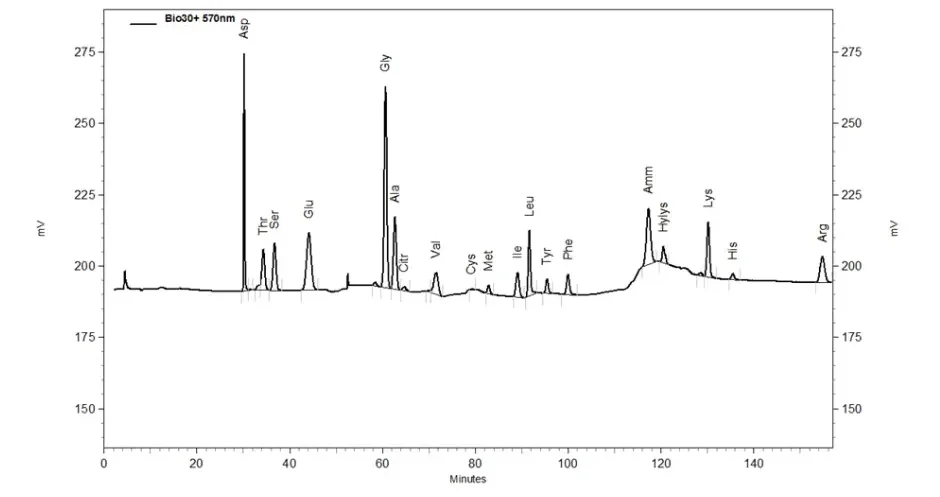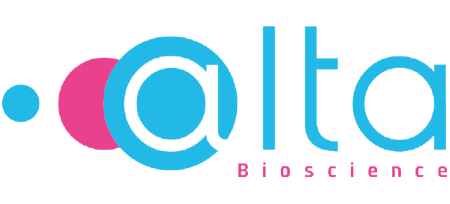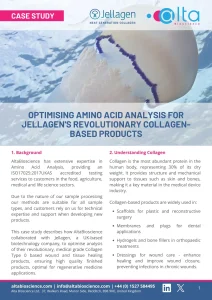Optimising Amino Acid Analysis for Jellagen’s Revolutionary Collagen-Based Products
Background
AltaBioscience has extensive expertise in Amino Acid Analysis, providing ISO17025:2017UKAS accredited testing services to customers in the food, agriculture, medical and life science sectors.
Due to the nature of our sample processing our methods are suitable for all sample types, and customers rely on us for technical expertise and support when developing new products.
This case study describes how AltaBioscience collaborated with Jellagen, a UK-based biotechnology company, to optimise analysis of their revolutionary, medical grade Collagen Type 0 based wound and tissue healing products, ensuring high quality finished products, optimal for regenerative medicine applications.
Understanding Collagen
Collagen is the most abundant protein in the human body, representing 30% of its dry weight. It provides structure and mechanical support to tissues such as skin and bones, making it a key material in the medical device industry.
Collagen-based products are widely used in:
- Scaffolds for plastic and reconstructive surgery
- Membranes and plugs for dental applications
- Hydrogels and bone fillers in orthopaedic treatments
- Dressings for wound care – enhance healing and improve wound closure, preventing infections in chronic wounds.
While traditionally derived from bovine sources, concerns over safety and religious considerations have led to the increased use of marine collagen from sources like fish skin and bones, jellyfish, and starfish.
Importance of Amino Acid Analysis in Collagen Products
Rigorous quality control is vital for collagen-based products to adhere to stringent healthcare standards. Amino acid analysis is an essential part of this quality assurance.
Collagen primarily consists of glycine, proline, and hydroxyproline:
- Glycine, the most abundant amino acid in collagen, gives collagen its characteristic strength and flexibility. This is due to the repetition of glycine residues, at every third amino acid, creating the tight packing of the collagen triple helix.
- Proline stabilises the collagen structure and is converted into hydroxyproline.
- Hydroxyproline, derived from proline, is essential for collagen stability, allowing the sharp twisting of the collagen helix.
Maintaining specific ratios of these 3 key amino acids ensures that products derived from alternative sources, such as marine collagen, can provide comparable structural integrity and functional benefits to traditional collagen sources.
Amino Acid Analysis of Marine Collagen from Jellyfish
Jellagen approached AltaBioscience for the amino acid analysis of their liquid collagen sample derived from jellyfish as part of their quality control procedures.
The client required total amino acid analysis plus separate analyses for hydroxyproline and hydroxylysine. At that time hydroxylysine was not part of our standard service.
Leveraging our extensive method development experience and our flexibility in providing tailored solutions, we created a bespoke method for quantifying hydroxylysine. The hydrolysed collagen samples were analysed using a high resolution lithium buffer program, which has the benefit of being able to optimally resolve hydroxylysine and hydroxyproline from other potentially co-eluting amino acids. This resulted in highly accurate quantification of the amino acids.

Above: Representative chromatogram of a sample containing Hylys, separated using the physiological fluid system with lithium as the mobile phase ion.
A Bespoke Amino Acid Analysis Method Validation
After years of collaboration, Jellagen reached a pivotal stage in their product development. Before market launch of their collagen powder, they required full method validation, with a specific focus on the quantification of hydroxyproline in their collagen powder.
At AltaBioscience, we recognise the importance of generating robust data that stands up to regulatory scrutiny, and in this next phase, we worked closely with Jellagen to design and execute method validation studies, with an emphasis on rapid result turnaround to aid quality control release.
We developed a method validation protocol that included multiple replicates for each sample type, spiked samples to determine percentage recovery, and defined clear acceptance criteria for the key parameters.
Following approval of the validation protocol we were able to expedite the validation study to meet Jellagen’s deadlines, delivering initial data within 5 working days and a comprehensive method validation report one week later which included all sample data, QC data, percentage recovery calculations, linearity and full traceability of all reagent and chemicals used in the study.
This fully comprehensive report provided Jellagen with the data required to reliably demonstrate accurate quantitation of hydroxyproline in their collagen products, which Jellagen could include in their regulatory dossier approval, demonstrating robust quality control of their products.
Conclusion
Through close collaboration with Jellagen, AltaBioscience created a bespoke program for high-resolution analysis of hydroxylysine and completed an expedited analysis program for hydroxyproline. Delivery of a validation report, tailored to the customer’s needs. assisted Jellagen with their regulatory approval process, and continues to support Jellagen’s quality control process for their revolutionary, collagen-based wound and tissue healing products.
“Working with the Jellagen Quality Assurance team during this project was a true demonstration of a collaborative partnership”, says Sarah Hawker, Head of Amino Acid Analysis at AltaBioscience, “their product knowledge and attention to detail were instrumental in ensuring the success of our work, making the entire process smooth and efficient. With the validation study completed, we are now proud to play our part in the quality release protocol for this groundbreaking technology”
“The partnership between AltaBioscience and Jellagen has proved to be highly successful”, says Rhodri Allen, Quality Manager at Jellagen. “The knowledge and expertise of the team at AltaBioscience, and the collaboration with Jellagen’s R&D team, have been instrumental in developing a validated method of analysis for a critical Quality Control release parameter of Medical Device production. Jellagen looks forward to a continued successful partnership with AltaBioscience.”
Download PDF




